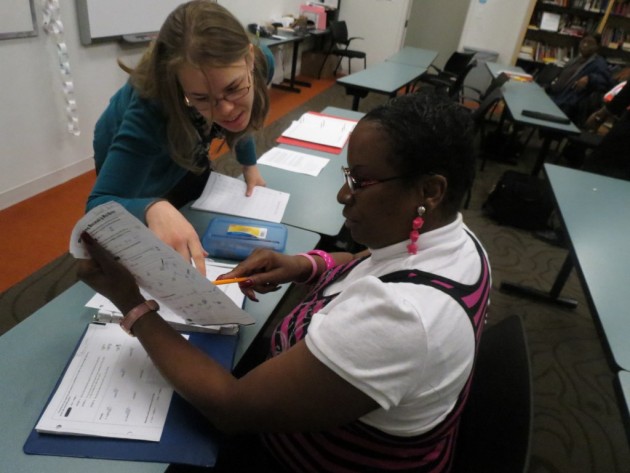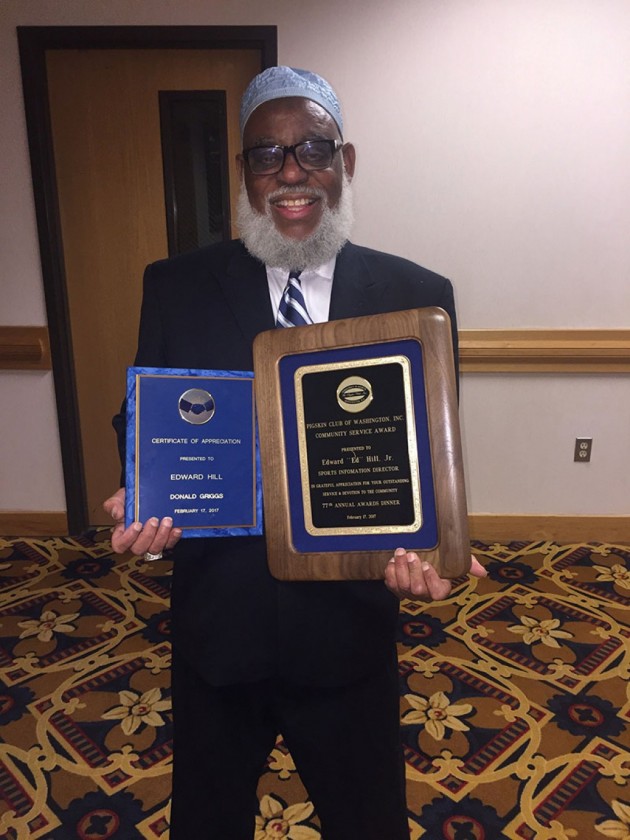
Instructor with the YWCA's GED program assists a student. This year, the program will graduate 100 students after initially starting with 13.
WASHINGTON – For more than 30 years, the 54-year-old African-American woman has struggled from one job to another without a high school diploma or anything to show that she has attained a level of education and experience that would allow her to compete in the work place.
Now, thanks to the YMCA-National Capital Area’s program to arm its participants with a Graduate Equivalent Diploma (GED), the woman, who declined to give her name, has that proof.
“My experience here has helped me a lot,” she said. “My education has improved, and I have received my certification in customer service. I know I will face the work force with more confidence in the future.”
The program has had great success in training those without high school diplomas and this year graduates its largest single class – 22 students. It is a dramatic improvement from its start in 2010, said Angela Hughes, manager of Program Operations.
“We started with 13 students, and now we serve over 100 each fiscal year,” Hughes said. “We got started to support the community’s needs. The YWCA wanted to do what it could to support adult literacy,”
The program began to address the dismal literacy rates among adults in the District.
The students in the program are mostly unemployed or underemployed, Hughes said. Many of the students were not able to get their high school diploma for reasons such as family issues, learning disabilities and teenage pregnancies.
“We have students as young as 18 up to 60 plus,” she said. “We also have international students. Some are seeking to finish their education, while others are in the program because the U.S. does not recognize their education from their country.”
Along with GED training, the program offers job shadowing, customer service certification and general life skills support, Hughes said.
“We have a holistic approach,” she said. “We have a culture of safety and comfort. It’s a wrap around approach. There is a student advisory board, guest speakers, round table lunches all of these things contribute to the positive environment.”
The adult literacy and GED program is mainly funded by the office of the state superintendent, along with private donations, she said.
“We have certified, full-time teachers during the day teaching our students the subjects on the GED test, such as language arts, math, science and social studies. Then we have part-time evening teachers who volunteer their time,” said LeAnn Harley manager of Marketing and Advocacy Communications.
Recently, the GED requirements have changed, making the final examination more difficult, Harley said. The reading and writing sections have merged as one to become language arts. The math section now includes some geometry. Also, the GED test is now completely computer based.
The changes make program more difficult, but Hughes is optimistic.
“We try to embrace new things and familiarize our self with the new test,” she said. “We work on testing anxiety, computer literacy and building confidence. There won’t be that much of an adjustment, we just have to teach new things.”
The students who graduate from the program have to first, register and then test in to see where they are academically and the final step is passing the GED exam.
The program also helps students with life after the GED through job announcements and job training.






